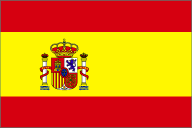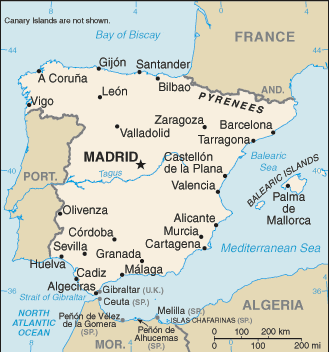Table of Contents
| Location and Size | Credit and Collections |
| Government | Risk Assessment |
| Legal System | Business Climate |
| People | Business Protocol |
| Economy | |
| Comparative Indicators |
12345
Location and Size
Spain is located in southwestern Europe, bordering the Mediterranean Sea, North Atlantic Ocean, Bay of Biscay, and Pyrenees Mountains. It has an area of 505,370 sq km, slightly more than twice the size of the U.S. state of Oregon.
Government
The Spanish government is a constitutional monarchy based on a parliamentary democracy. Below are the different branches:
Executive:
- Chief of State: King Felipe VI; Head of Government: President of the Government (Prime Minister equivalent) Pedro SanchezPerez-Castejon; Vice President (and Minister of the Interior): Maria del Carmen Calvo Poyato
- Cabinet: Council of Ministers designated by the president
- Council of State: The supreme consultative organ of the government, but its recommendations are non-binding
Legislative: Bicameral
- Las Cortes Generales (National Assembly): Consists of the Senate 208 members directly elected by popular vote and 56 appointed by the regional legislatures
- Congreso de los Diputados (Congress of Deputies): 350 seats, each of the 50 electoral provinces fills a minimum of two seats and the North African enclaves of Ceuta and Melilla fill one seat each; the other 248 members are determined by proportional representation based on popular vote
Judicial: Tribunal Supremo (Supreme Court)
- The legislature formulates laws
- The executive (actually the Council of Ministers led by the Prime Minister), proposes laws and regulations and enforces those actions that the legislature endorses via administrative orders which can be reinforced by police action or armed force.
Legal System
Spain has a civil law system and accepts compulsory International Court of Justice (ICJ) jurisdiction with reservations. The judicial system is open and transparent, although sometimes slow moving.
People
- Population: 47,222,613 (2023 est.)
- Population growth rate: 0.38% (2023)
- Languages:Castilian Spanish (official nationwide) 74%, Catalan (official in Catalonia, the Balearic Islands, and the Valencian Community (where it is known as Valencian)) 17%, Galician (official in Galicia) 7%, Basque (official in the Basque Country and in the Basque-speaking area of Navarre) 2%, Aranese (official in the northwest corner of Catalonia (Vall d’Aran) along with Catalan, <5,000 speakers); note – Aragonese, Aranese Asturian, Basque, Calo, Catalan, Galician, and Valencian are recognized as regional languages under the European Charter for Regional or Minority Languages
- Literacy: 99% (2023 est.)
- Ethnic Make-up: Spanish 84.8%, Moroccan 1.7%, Romanian 1.2%, other 12.3% (2023 est.)
- Religions: Roman Catholic 20.1%, Protestant 14.8% (includes Dutch Reformed, Protestant Church of The Netherlands, Calvinist), Muslim 5%, other 5.9% (includes Hindu, Buddhist, Jewish), none 54.1% (2023 est.)
Economy
Spain’s admission into the European Union (EU) — now called the European Union back in in January 1986 required the country to open its economy to trade and investment, modernize its industrial base, improve infrastructure, and revise economic legislation to conform to EU guidelines.
Following strong expansion in 2022, economic activity is expected to slow down in 2023. Labor market resilience and the implementation of the Recovery and Resilience Plan (RRP) are set to sustain growth, which is forecast to accelerate further in 2024. Headline inflation is projected to moderate on the back of to lower energy prices. The still high general government deficit is set to keep decreasing but more gradually than in the past two years due to slower revenue growth.
Spain’s mixed capitalist economy is the 12th largest in the world, and its per capita income roughly matches that of Germany and France. However, it is based principally on agriculture, real estate, and tourism. It is also hampered by heavy private debt, a weakened banking sector resulting from the crisis in the residential construction sector, and deterioration in public finances.
Leading Markets (2023): France 15.1%, Germany 11.3%, Italy 7.8%, Portugal 7.1%, UK 6.9%, US 4.4%
Leading Exports – Commodities: Machinery, motor vehicles, foodstuffs, pharmaceuticals, medicines, other consumer goods
Leading Suppliers (2023): Germany 14.2%, France 11.9%, China 6.9%, Italy 6.8%, Netherlands 5.1%, UK 4%
Leading Imports – Commodities: Machinery and equipment, fuels, chemicals, semi-finished goods, foodstuffs, consumer goods, measuring and medical control instruments
Top Industries: Textiles and apparel (including footwear), food and beverages, metals and metal manufactures, chemicals, shipbuilding, automobiles, machine tools, tourism, clay and refractory products, footwear, pharmaceuticals, medical equipment
Top Agricultural Products: Grain, vegetables, olives, wine grapes, sugar beets, citrus; beef, pork, poultry, dairy products; fish
Comparative Economic Indicators – 2023
| Spain | Portugal | France | Morocco | Italy | |
| Population (millions) | 49.3 | 10.3 | 67.3 | 34.3 | 62.2 |
| Population growth rate (%) | 0.73 | -0.27 | 0.37 | 0.95 | 0.16 |
|
Age Structure (%)
(15 – 64 years old) |
66.57 | 65.71 | 61.7 | 67.57 | 64.72 |
|
Age Structure (%)
(65+ years old) |
18.15 | 20.26 | 19.82 | 6.95 | 21.69 |
| Literacy (%) | 98.3 | 95.7 | 99.0 | 68.5 | 99.2 |
| Unemployment rate (%) | 17.2 | 8.9 | 9.4 | 10.2 | 11.3 |
| Inflation (%) | 2.0 | 1.6 | 1.2 | 0.8 | 1.3 |
| Population below poverty line (%) | 21.1 | 19.0 | 14.2 | 15.0 | 29.9 |
| GDP** (USD billions) | 1,778.0 | 314.1 | 2,856.0 | 298.6 | 2,317.0 |
| GDP real growth rate (%) | 3.0 | 2.7 | 2.3 | 4.1 | 1.5 |
| GDP per capita** (USD) | 38,400 | 30,500 | 44,100 | 8,600 | 38,200 |
| Public debt (% of GDP) | 98.4 | 125.7 | 96.8 | 65.1 | 131.8 |
| Exports (USD billions) | 313.7 | 61.0 | 549.9 | 21.4 | 496.3 |
| Imports (USD billions) | 338.6 | 74.7 | 601.7 | 39.6 | 432.9 |
| Reserves of foreign exchange and gold (USD billions) | 69.41 | 26.11 | 156.4 | 26.27 | 151.2 |
| Currency | Euro EUR |
Euro EUR |
Euro EUR |
Dirham MAD |
Euro EUR |
| Exchange rate per USD) 06/18/2023 | 0.90 | 0.90 | 0.90 | 9.62 | 0.90 |
| Exchange rate (per EUR) 06/18/2023 | n/a | n/a | n/a | 10.63 | n/a |
Economic Data from CIA World Factbook
Credit and Collections
Spain has a modern bankruptcy law that is fair and transparent.
Dispute Resolution
Spain is a member of both the International Center for the Settlement of Investment Disputes (ICSID) and the New York Convention of 1958 on the Recognition and Enforcement of Foreign Arbitral Awards.
There is no U.S.-Spain agreement on the mutual recognition of judgments. Therefore, U.S. citizens seeking to execute American court judgments in Spain must follow Spanish law, in this instance a complicated procedure known as the “exequator” process.
Due to the American Embassy’s experience in attempting to assist American citizen claimants, the Embassy recommends that Americans who conclude contracts with Spanish entities specifying the U.S. as the venue for adjudicating disputes also obtain an agreement regarding how a possible U.S. judgment will be executed in Spain. ABC-Amega, however, suggests that companies in countries that are also signatories to the NY Convention of 1958 include an arbitration clause in their documents.
Risk Assessment
Coface Country Risk Rating: A2 — Household consumption is set to decline further, especially in durable consumer goods. Conversely, accommodative financing conditions should continue to support growth in residential construction. The vigorous real estate market will likely continue to fuel the surge in investment, hampered by a slight slowdown in the corporate sector.
Coface Business Climate Rating: A1 — The labor market will remain on a positive trend, with a continued decline in the unemployment rate, but job creation is projected to be less dynamic.
The number of corporate failures recorded by the National Institute of Statistics fell 6% in the first four months of 2023. Corporate failures are concentrated in the construction and property services sectors and, to a lesser extent, in trade and industry.
Business Climate
The slowdown in foreign demand is likely to curb export growth, but weak domestic demand will restrict import growth even more.
Economic Freedom: Spain’s economic freedom score is 65.0, making its economy the 61st freest in the 2023 Index of Economic Freedom. Spain is ranked 29th out of 44 countries in the European region, and its overall score is well above the world average.
Regulatory System: Spain modernized its commercial laws and regulations following its 1986 entry into the European Union. Its local regulatory framework compares favorably with other major European countries. Bureaucratic procedures have been streamlined and much red tape has been eliminated, though permitting and licensing processes can still suffer delays.
Intellectual Property Rights: Spanish patent, copyright, and trademark laws all equal or exceed EU levels of protection. Spain is a party to the Paris Convention, Bern Convention, the Madrid Accord on Trademarks, and the Universal Copyright Conventions. Spain has ratified the World Intellectual Property Organization’s (WIPO) Copyright Treaty (WCT) and the WIPO Phonograms and Performances Treaty (WPPT), the so-called Internet treaties.
The Internet presents the most problematic area in Spain and Internet piracy has increased sharply over the past several years. Copyright-dependent industries – music, movies, and entertainment software – continue to report a steady decline in sales attributable to digital piracy, and cite Spain as having one of the worst problems in the world in this regard.
Exchange Control: There are no controls on capital flows. Remittances of profits, debt service, capital gains and royalties from intellectual property can all be effected at market rates using commercial banks.
Private Ownership: Spanish law establishes clear rights to private ownership. Foreign firms receive the same legal treatment as Spanish companies.
Corruption: Corruption is perceived as moderate. According to Transparency International’s 2023 Corruption Perceptions Index, Spain’s index is 5.8, similar to that of Israel. Spain (and Israel) are the 30th least corrupt out of the 180 countries rated by TI.
Political Violence: The Government of Spain is involved in a long-running campaign against Basque Fatherland and Liberty (ETA), a terrorist organization founded in 1959 and dedicated to promoting Basque independence. ETA has traditionally targeted Spanish government officials, members of the military and security forces, journalists, and members of the Popular Party and Socialist Party for assassination. U.S. citizens and U.S. companies have not been ETA targets.
Business Protocol
Trust and personal relationships are the cornerstone of business in Spain. The Spanish prefer to do business with those they know and trust. Therefore, it is important you spend sufficient time letting your business colleagues get to know you. Once you develop a relationship, it will prevail even if you switch companies, since your Spanish business colleagues’ allegiance will be to you rather than the company you represent.
Face-to-face contact is preferred to written or telephone communication. Communication is formal and follows rules of protocol. Avoid confrontation, if possible. Spaniards do not like to publicly admit that they are incorrect.
Decisions are not reached at meetings. Meetings are for discussion and to exchange ideas. Decision-making is held at the top of the company. You may never meet the person who ultimately makes the decision.
Make sure all your printed material is available in both English and Spanish. Not all business people speak English, so it is wise to check if you should hire an interpreter.
Spaniards are extremely dress-conscious and will perceive your appearance as an indication of your professional achievement and relative social standing
**********
Subscribe to the Credit-to-Cash Advisor
Monthly e-Newsletter — It’s Free
This information is provided by ABC-Amega Inc. Providing international receivable management and debt collection services for exporters to more than 200 countries. For further information, contact [email protected].

